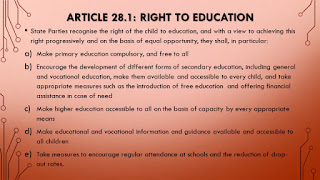UNIVERSAL CHILDREN'S DAY - NOVEMBER
20-2018
Universal
Children's Day - November 20-2018. United Nations Universal Children's Day was
established in 1954 and is celebrated on November 20th each year to promote
international togetherness, awareness among children worldwide, and improving
children's welfare.
November
20th is an important date as it is the date in 1959 when the UN General
Assembly adopted the Declaration of the Rights of the
Child. It is also the date in 1989 when the UN General assembly adopted the
Convention on the Rights of the Child.
Since
1990, Universal Children’s Day also marks the anniversary of the date that the
UN General Assembly adopted both the declaration and the convention on
children’s rights.
Mothers
and fathers, teachers, nurses and doctors, government leaders, human rights activists, religious and community elders, corporate moguls and media
professionals as well as young people and children themselves can play an
important part in making Universal Children’s Day relevant for their societies,
communities and nations.
Universal
Children’s Day offers each of us an opportunity to advocate, promote and
celebrate children’s rights, translating into dialogues and actions that will
build a better world for Children. This is a day for children, by children, all
over the world to help save children’s lives, fight for their rights and help
them fulfil their potential.
Reading is
one of the best lifetime habits we can acquire and also encourage in our
children. There are some tried and true methods that have worked in encouraging
children to love reading. Read to your children, read with your children and
let your children see that you enjoy reading. Buy books for your children and
encourage relatives and friends who express an interest in buying gifts for
your children to make some of those gifts books. Take your children to the
library to borrow books and introduce them to some of your favourite authors.
CULTURALLY RELEVANT BOOKS
Culturally relevant books display the cultural
heritage of students and are directly related to their lives. Books are
culturally relevant when there are similarities between the characters and the
lives of students and their families. When there are relationships between the
students’ experiences and those told in the stories the children are engaged.
Books are also culturally relevant when students are familiar with the places
and themes mentioned in the stories. Culturally relevant books may also contain
familiar phrases or figures of speech.
What children read shapes what they think of
themselves, of others and of the world. Children’s literature does not always
reflect diversity. “The ways in which we are misrepresented, are marginalized,
or deleted vary according to our identities,” Penn Graduate School of Education
expert on children’s literature Dr. Ebony Elizabeth Thomas says, “but all
youth-focused narratives that enter popular culture should be more
representative. It's not just kids of color, kids from the margins who need
diverse literature and media. It's all kids who need all stories about all kinds
of people.”
Books and other printed materials should represent the
interests of the students and reflect the diversity of students in any
classroom. Some classrooms are devoid of reading materials written by racialized
authors or which prominently feature the lively and rich histories of the
diverse cultures represented in the school. In many cases there is no
representation of racialized people not even the images on the walls of the
school.
Many children have never been exposed to their own
cultural heritage in the books they read. A culturally responsive classroom
acknowledges and appreciates children’s home cultures and attempts to build
upon the uses of language and literacy with which children are already
familiar. Familiar stories and
predictable books may help children express their cultural uniqueness and share
their personal stories.
Culturally relevant books include books that represent
the cultures of various races and ethnic groups in accurate and respectful
words and images.
Caregivers and parents can foster an interest in and enjoyment of reading in very young children by reading to infants (less than one year old.)
























No comments:
Post a Comment